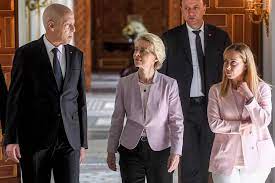Tunisia is free to ‘wire back’ EU money if it doesn’t want it, says European Commissioner

Brussels: Olivér Várhelyi, the European Commissioner for enlargement and neighbourhood, has said Tunisia is free to “wire back” the €60 million in EU funds that were transferred earlier this week.
It comes days after Tunisian President Kais Saied publicly rebuffed the European Union’s financial offer, saying it was “derisory” and contrary to the memorandum of understanding signed in mid-July, which allocates money for budgetary support, migration management and renewable energy.
“Tunisia, which accepts cooperation, does not accept anything resembling charity or favour, because our country and our people do not want sympathy and do not accept it when it is without respect,” Saied said, according to a press release from the presidency.
“Consequently, Tunisia refuses what has been announced in recent days by the EU.”
The blunt remarks were widely covered by the media and caused surprise in Brussels, where the memorandum with Tunisia has been touted as a blueprint for future agreements with neighbouring countries to stem migration flows.
On Wednesday, the European Commission attempted to set the record straight and confirmed that €60 million in budgetary support had already been paid to the Tunisian treasury as part of a first instalment of €127 million.
The €60 million, part of a previous post-COVID recovery plan, was transferred upon the request of the Tunisian government, a spokesperson noted.
Additionally, the Commission said €13 million and €8 million had been contracted with the International Organization for Migration (IOM) and the United Nations Refugee Agency (UNHCR), respectively, to assist with the “voluntary returns” of migrants.
“We’ve taken note of the communiqué by the Tunisian presidency. I think you will obviously understand that the EU conducts its relations with partners through direct contacts and that’s exactly what we’re doing,” a spokesperson said, trying to maintain diplomatic language amid the row.
On Thursday, Olivér Várhelyi, the European Commissioner for enlargement and neighbourhood who oversees the memorandum’s implementation, took things up a notch when he openly invited Tunisia to “wire back” the €60 million if it does not want it.
“Tunisia formally requested payment of €60m budget support by the EU on 31 August. On this basis, the EU disbursed the payment on 3 Oct. It concerns budget support from 2021 – not linked to the EU-Tunisia (memorandum),” Várhelyi wrote on X, formerly Twitter.
“Tunisia is free to cancel its formal disbursement request and wire back the money to the EU budget,” he added.
To emphasise his point, Várhelyi included two screenshots: a recent Facebook post by the Tunisian government denying having asked for the money and the request form, signed 31 August, in which Tunisian Economy Minister Samir Saïed urged for the €60 million in budgetary support to be disbursed. (The number of the bank account was blacked out.)
“(The) EU values its partnership (with) Tunisia & stands ready to cooperate in the spirit of genuine partnership,” Várhelyi went on, barely hiding his frustration.
“Implementation of the (memorandum) should continue once Tunisia returns to the spirit of our strategic & comprehensive partnership based on mutual respect.”
It was not immediately clear if the implementation was temporarily suspended or will still go ahead.
Ever since its signature, the EU-Tunisia memorandum has been the target of intense criticism from the European Parliament and humanitarian organisations, who have raised the alarm about the abuses allegedly committed by the Tunisian authorities against sub-Saharan migrants, including instances of collective expulsions to the Libyan border.
Saied, in particular, has been strongly condemned for his racist views of black Africans, whom he has described as being part of a “criminal plan to change the composition of the demographic landscape of Tunisia.” Further criticism was piled on Saied after he denied entry to five Members of the European Parliament and, days later, postponed an official visit of a delegation of the European Commission.
Last month, the European Ombudsman formally asked for clarifications about additional safeguards to guarantee full respect for human rights.
Earlier this week, European Council President Charles Michel openly criticised the way in which the Commission negotiated the agreement.
“It is important to follow the procedures and make sure that member states give their mandate to the Commission and then member states, during this process, say yes or no to what the Commission has negotiated,” Michel said in an interview with RTVE, Spain’s public broadcaster.
“This is a clear lesson: the involvement of member states is crucial to its success.”
Michel’s remarks prompted the Commission to break with its strict “we don’t comment on comments” policy and issue a stark rebuke.
“In our view, (the comments) are partially inaccurate and in no way strengthen the EU’s ability to act effectively in dealing with the difficult issue of migration,” a Commission spokesperson said, noting the executive had “repeatedly” informed ambassadors in Brussels about the evolution of the negotiations.
“The Commission is legally free to negotiate agreements





